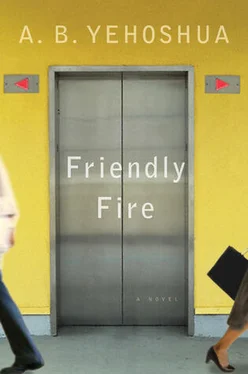"Believe me, Mr. Kidron, our calculations are accurate. There are cracks in the shaft."
"So open up the elevators and prove to the construction company that they are to blame."
"Only the manufacturer is authorized to open the elevators. I am only the designer."
"That's what I said, you're a corrupt bunch who shift the blame from one to the other so we can't catch you. But the tenants are sick of it, the blame is now on you, Mr. Ya'ari, and if you want to be free of it, take it to court."
Ya'ari studies him. A man with innocent blue eyes, not tall, but slender under the wet coat. His hiking shoes are covered in mud. Before his son was killed he was surely a pleasant and friendly man.
"As you wish, I'll go to court. But tell me, why is the lawsuit directed only at me?"
"Because you're an approachable person. Even your secretary is nice."
Ya'ari looks over at the tree fighting the wind and places a gentle hand on the bereaved tenant's shoulder.
"Yes, I am an approachable person. It's a failing of mine, but maybe also a virtue. This is an ideal day to locate the defect that is tormenting you, so why wait for the court to acquit me while in the meantime you'll be supporting a hungry lawyer? Let's go take advantage of the storm tonight and check the shaft once and for all. Tomorrow my wife is returning from Africa, and she won't let me leave her in the middle of her first night back. That leaves us only tonight, and because we'll have to shut down all the elevators, the best time is the wee hours, say between two and three in the morning, in the hope that all the tenants will be in their apartments. Because we don't have porters to carry late-night partygoers up the stairs to the umpteenth floor."
Kidron brightens. "Okay," he says, "I'll put up notices in the building and warn the residents not to get home late tonight. How long will it take?"
"You will be surprised to learn that despite my age this is the first time I have gone hunting for winds at night. Like surgery or war, you know when you start, but not when you'll finish."
The head of the tenants' committee takes it upon himself to summon a representative of the construction company to be present also.
"Talk tough to him, the way you do to me," Ya'ari advises. "Threaten him." And he eases the man out the door.
And now, of course, just as he is about to hurry to Gottlieb's factory to make good on his promise to Kidron, his employees come to him with questions and try to show him plans and diagrams. By the time he manages to get free of these responsibilities and arrives at the elevator factory, it is dusk. And to his surprise, the blue ambulance is still there.
"Not only did I feed your father lunch with a spoon myself, and wipe away the crumbs," Gottlieb informs him, "we're also cutting him a new piston. Learn from this, young man, the power of old friendship. And it's best that a man have only one such dear friend, because two will break him."
"True," Ya'ari says, laughing. "But what about the dear son of the dear friend?"
And he tells him about his promise to hold a Night of the Winds. A skilled technician is needed, someone who can remove the roof of the elevator, then reassemble it.
"In the middle of the night? You know what that's gonna cost me?"
"It won't break you. Because we already paid that relative of yours in advance."
Gottlieb shoots Ya'ari an icy look.
In the past few years, Ya'ari has paid few visits to this factory. These days orders are placed online, and besides, the younger engineers in his firm are not enthusiastic about Gottlieb's elevators and fight for more up-to-date models that operate without machine rooms. Now he is amazed by how the factory has expanded. Big impressive cutting machines slice sheets of steel with high precision. Drill punches produce control panels. Remote-control robots assemble electric motors. The high-ceilinged halls are clean and orderly, if a bit dim, and skilled workers circulate among the machines, seeming slightly tense at the approach of the factory owner.
Gottlieb, far from letting himself be cowed by the Chinese elevators that Ya'ari's engineers have been recommending to the construction companies, has opened new markets for himself and now exports elevators to Turkey and Greece. He even gets orders from England. From the corner of his eye Ya'ari sees a new design wing, filled with engineers, technicians, and draftsmen, hired to compete with his own. And yet deep inside the thriving factory there is a small hall where merrily hums an ancient metal lathe, and here Ya'ari finds his father in his wheelchair, fascinated by the work and vibrating to its rhythms. In the corner sit Francisco and Hilario, silent and exhausted.
"Abba," he leans over and hugs his father, "are you convinced the lathe won't work if you don't stare at it?"
"That's what I tell him, too," Gottlieb says, "but your father apparently enjoys the chirping noises. His Filipinos are too quiet for him. Come, Amotz, let's take your father to our candle-lighting. You're about to see a Hanukkah menorah no less unusual than the elevator he built in Jerusalem."
The old man does not answer, merely looks with puzzlement at his friend and his son. Ya'ari wheels his father's chair after Gottlieb as the manufacturer leads the way to the cafeteria, where workers on the shift are assembling for the lighting of the candles. In the center of the hall stands a menorah fit for the factory, composed of nine tiny models of elevators, with a small bulb installed in each.
At the entrance is a basket of kippas, and on the tables are arrayed trays of small but still warm jelly doughnuts. The workers put on the skullcaps and crowd together silently. They know this menorah well and are no longer impressed. How many candles today? Gottlieb asks an Orthodox worker who stands ready to chant the blessings. Seven, says the man, and waits for a signal from the boss.
Gottlieb goes to a panel of numbered buttons and presses the red emergency switch, which lights up the shammash, a replica of the latest-model elevator produced at the factory; and the worker bursts into sacred melody, his Sephardic voice sweet and clear. As the blessings end, Gottlieb presses the seventh-floor button, and slowly, one at a time, seven more miniature elevators light up.
"Well, what do you say?" He turns proudly to the father and son. "A miracle like this would have astonished even the Maccabees."
Ya'ari chuckles and thinks good-naturedly, It's all right, there's this side to Gottlieb, too. But tomorrow night we'll finally light real candles with Daniela.
12.
AFTER THE ISRAELI visitor's headache has been dissolved by a long, deep sleep, she showers and returns refreshed to the ground floor, where she finds the tables rearranged for the farewell dinner. The big table has been moved to the edge of the hall and placed upon a small wooden stage, then covered with an embroidered map of Africa. The remaining tables are positioned in three rows, as in a theater, with benches on one side only, so that diners will face the stage. In the open lot outside the building, the scientists are loading the pickup trucks with food coolers and duffel bags and new digging tools, and Daniela can also see a group of Africans in colorful clothes decorated with ribbons; some of them are leaning on long sharpened sticks. Yirmiyahu arrives from the infirmary, moving slowly, and on his way to take a shower and change his clothes he cautions his sister-in-law not to make light of the ceremonial dinner: For some reason they attach greater importance to you than you deserve.
"You know it's impossible to make me more important than I am," she teases him, "and what about you? How's your headache?"
He regards her soberly. Patience, he says. Tomorrow, when you're gone, the pain will pass. And without waiting for a reply or a protest he touches her shoulder in a gentle gesture of reconciliation, then hurries to his room.
Читать дальше












